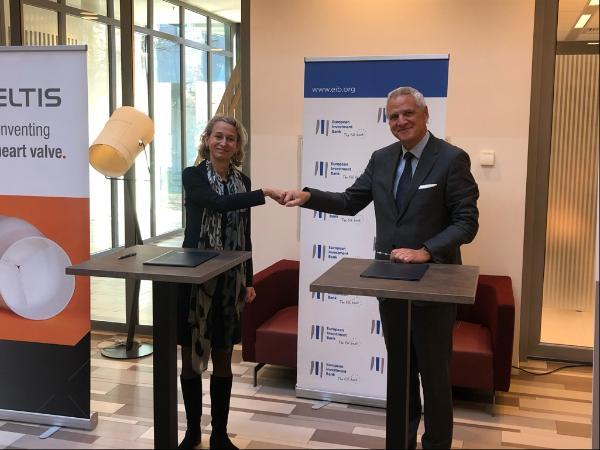
- The EIB has signed a €15 million quasi-equity agreement with Dutch-based medical technology company Xeltis, supported under the pan-European Guarantee Fund (EGF).
- Xeltis will use the funding to accelerate the clinical programmes of three restorative devices that can substantially impact cardiovascular medicine.
- EGF is part of the €540 billion EU rescue package in response to the COVID-19 pandemic.
The European Investment Bank (EIB) has signed a €15 million quasi-equity financing agreement with medical technology company Xeltis, based in Eindhoven in the Netherlands. Xeltis is pioneering a restorative approach in heart valve replacement and vascular therapies, overcoming the limitations of existing options. Xeltis’ so-called endogenous tissue restoration (ETR) uses the patient’s natural healing system to restore heart valves and blood vessels with the patient’s own tissue. The EIB’s non-dilutive financing will support the acceleration of clinical programmes for three of Xeltis’ revolutionary, restorative devices. The financing is being made available under the European Guarantee Fund (EGF), an EIB Group initiative in partnership with EU Member States to support European companies whose business was impacted negatively by the COVID-19 pandemic.
“In terms of medical technology innovations, what Xeltis is doing almost sounds like science fiction, yet it is already here,” said EIB Vice-President Kris Peeters. “I think Europe can be proud that it is a breeding ground for such cutting-edge technology, which has the potential to significantly impact medical care in a number of fields. I am proud that, with help of the European Guarantee Fund, we can get behind Xeltis to help them accelerate their way out of this difficult global phase.”
Eliane Schutte, Xeltis CEO, added: “EIB financial support can make the difference in the time our restorative heart valves and blood vessels reach patients that today have limited or no options at all for their conditions. Xeltis has the most advanced restorative technology platform in cardiovascular medicine and may positively impact millions of lives.”
Xeltis’ devices are vascular grafts and heart valves designed to turn into living valves and vessels by harnessing the body’s natural healing process and by facilitating tissue formation once implanted. Xeltis’ devices are made of supramolecular polymers shaped — through a process called electrospinning — into a microstructure that allows tissue restoration. Leveraging the versatility of its technology platform, which can be used to improve many types of implants, Xeltis initiated the development of three types of cardiovascular implants: pulmonary heart valves, coronary artery bypass graft and haemodialysis access grafts, the roll-out of which is set to be accelerated by this EIB financing.
Background information:
The EIB is owned directly by the EU Member States – the Netherlands owns 5.2% of its shares – and with 27 sovereign states as backers can therefore borrow funds at very favourable rates on the capital market. The EIB made approximately €2.2 billion available in loans for projects in the Netherlands in 2020.
The European Guarantee Fund (EGF) was set up by the EIB Group with contributions from The Netherlands and other EU Member States to shield companies suffering from the COVID-19 crisis. Using nearly €25 billion in guarantees, the EGF allows the EIB and the EIF to quickly make loans, guarantees, asset-backed securities, equity and other financial instruments available to mostly small and medium-sized enterprises, to allow them to come through difficult times and grow their way out of the crisis. The EGF is part of the European Union’s recovery package aiming to provide a total of €540 billion to boost those parts of the EU economy that have been hit the worst.
Xeltis is a Swiss-Dutch clinical-stage medical device company, pioneering a restorative approach in cardiovascular therapy. Based on the revolutionary supramolecular polymer materials co-invented by Professor Jean-Marie Lehn (who received a Nobel Prize in 1987 for this technology), Xeltis’ proprietary technology platform enables the patient’s own body to naturally restore a new blood vessel or heart valve. Initially acting as normal synthetic grafts (valve or vessel), the molecular chemistry of Xeltis’ products allow the colonisation of the polymer by human cells and its progressive replacement by healthy tissue until full and complete restoration and takeover of natural valve or vessel function. Xeltis is currently the most advanced regenerative cardiovascular platform based on polymer technology with several products at the clinical stage.
For multimedia materials, please download the folder at the following link:
https://we.tl/t-F2osgo6MQs




